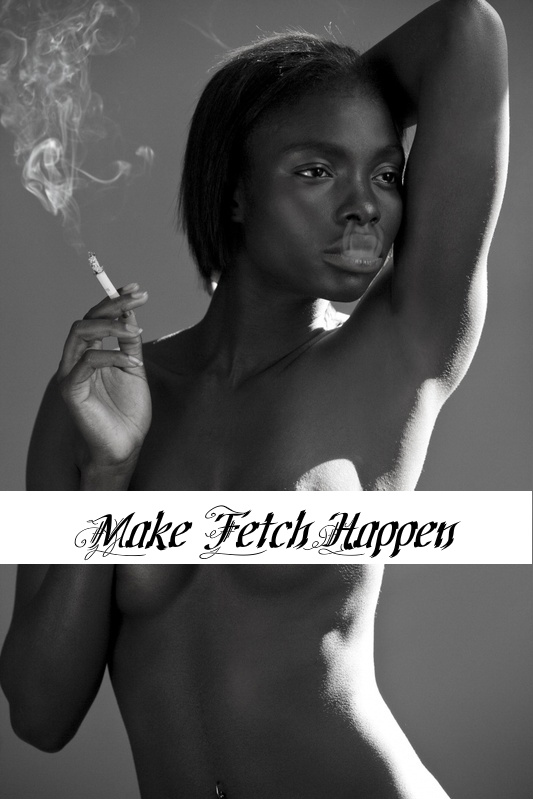 Regarding Camille's comment in the last entry about this article posted at The FADER . Zachary's Smile is a vintage boutique that also produces clothing for its own label. This season the boutique is mad for African prints, particularly those of the Ivory Coast:
Regarding Camille's comment in the last entry about this article posted at The FADER . Zachary's Smile is a vintage boutique that also produces clothing for its own label. This season the boutique is mad for African prints, particularly those of the Ivory Coast:...the new printed dresses are made from fabric exclusively from the Ivory Coast. There is an endless choice of prints—from hot and tropical florals to a particularly fetching heart print—in a limited fabric run with something to tickle pretty much any girl's fancy.
That kind of cultural appropriation annoys me but then, my eye starts to twitch anytime I see a non-Asian woman dressed in a Qipao with chopsticks in her hair at some party.
There is just something about traditional clothing that is sacred to me. I'm not bothered by small elements, like a scarf or jewelry woven into an outfit. I myself have worn clothing with kente cloth even though, according to my National Geographic DNA test, my ancestors probably didn't come from Ghana. What gets me are the head to toe ensembles, and we've all seen it. You know the type, it starts off innocently enough with someone buying a conical straw hat to wear in the garden and then BAM! All of a sudden she is shopping exclusively at Uwajimaya and her wardrobe is full of mandarin collar jackets that she bought at Chico's. And black folks are not immune from this behavior, Lawrence Fishburne and Wesley Snipes I am looking at you.
But I digress. All I really want to say is that I had to roll my eyes when I read this. First of all, the assertion that because of X designer, tradition clothing is fashionable, is offensive. I hate the idea of someone buying up a bunch a fabric from the Ivory Coast to make cute little size 4 dress (only to be dumped onto a clearance table when it's pronounce "out") for the Gossip Girl set. And yeah, I'm also annoyed because really, boho black women in the US have been incorporating traditional textiles and clothing into their wardrobes forever but things like this it only seems to be noticed when white women adopt it. Cornrows? Bo Derek invented that beach ready hairstyle in the 80s. Velvet tracksuits? That's the terrain of Juicy Couture. Nameplate necklaces?* Carrie" from SATC. Remember when Carrie referred to it as her "ghetto" gold? Also no one had big ass lips until the day the heavens parted and Angelina Jolie was born.
But I'm a hyprocrit too. If the retailer was Black I probably be filling my online shopping cart with those frocks.
*as the child of a black Panamanian woman, I was issued one at birth.
ETA: Read another blogger's take on it here.






16 comments:
Fashion is ultimately about people trying to be what they are not.
thank you, thank you, THANK YOU. we were starting to go a little mad from thinking we were the only ones feeling similarly. YOU. ARE. A. GENIUS.
feel free to read our recent post about this.
xo
@Brigitte - Ha ha, true that. If the shop owner was black I'd have already bought the whole collection. But she's not, so I won't.
@Anonymous - Fashion, at its best, is a creative attempt to express to the outer world something about our inner world. It can never be false, fake, or phoney. A reflection is simply a reflection, it is not the whole story. Our outer shells are only ever a small percentage of our stories anyhow.
(laughs) I love this article. I too get pissed off when people are into traditional garb because it's "in." But I'm not sure how I feel about people of other cultures reappropriating traditional clothing. On the one hand I think, "Well, you know, they like it and people should wear what they link," but on the other hand, when I see people walking around in a full outfit, it's just like, "What are you doing?"
I don't know. I've seen these frocks--in person. They're cute. Very cute. My sister, who studied abroad in Africa LOVED them. She maintained, however, that she could get the $300 dress for about $40 in Africa. But then again she'd have to pay $1,000 for a ticket over there.
I don't know guys...I really dont' see why this is an issue. Sometimes African print it in fashion, sometimes it's not. As Heidi Klum says, "One day you're in, the next you out." Every culture is seen as source for inspiration, from mandarin collar shirts to jodhpur pants. I really don't mind that people are wearing traditional prints in the name of fashion.
I read a lot of blogs, and I'm just getting this feeling that we're starting to be these type of 'chip on my fashion shoulder' girls who can't see that fashion is fun. Some issues, like Lebron, are worth getting worked up over. Traditional African print, CUTE CUTE dresses...so what?
@ NotAnnoyed...Fashion can be fun but fashion isn't really evolving which is why I sometimes have a problem with it. A lot of people couldn't care less about something like this and that's perfectly fine, there are plenty of blogs out there, so I'm sure if you keep searching, you'll find plenty that think everything about these dresses if fab.
As a West African,I'm personally annoyed by this entire trend.The whole premise of Ankara being "discovered" and just the lack of creative design is just ridiculous.Creativity is very much central to West African dress and they missed the boat, peddling someone else's cultural rather tactlessly and having the nerve to charge alot.Have the same dress in jersey fabric and it would rot in the store..I bet they bought the initial fabric for real cheap too..
I'm just tired of people playing these games with Africans and our culture.Tired.
Isn't this wax print fabric printing Dutch in its origins? Isn't that what some of Yinka Shonibare's work has been about?
From Wikipedia:
A key material in Shonibare's work since 1994 are the brightly coloured 'African' fabrics (Dutch wax-printed cotton) that he buys himself from Brixton market in London.
"But actually, the fabrics are not really authentically African the way people think," says Shonibare. "They prove to have a crossbred cultural background quite of their own. And it’s the fallacy of that signification that I like. It’s the way I view culture—it’s an artificial construct." (2) Today the main exporters of 'African' fabric from Europe are based in Manchester, England and Vlisco from Helmond, the Netherlands.
Last year a local (white) designer in my neighborhood had a whole line of dresses, skirts, and jackets made using this fabric though not in my size, or I would have bought them. They were beautiful and in styles that I would wear, unlike the more traditional styles in which these fabrics are usually made. And Anthropologie is also selling wax print cotton dresses for $298. If they'd had my size I also would have bought one. I figure if I'm wearing it, it's black style.
@ Anon.
I'm not sure what you are talking about. These dresses aren't made from faux African textiles imported from Europe, the fabric in these dresses is from the Ivory Coast. But I agree that there are a lot of fake African textiles being sold as the genuine article.
I'm (and Shonibare is) not talking about fake fabric--thanks to Dutch colonization, the origins of wax print cotton is as an export to Africa:
http://www.metropolismag.com/html/content_1200/ent.htm
Thus something we so identify as "African fabric," while possibly made in Africa, has European origins. Colonization influenced both peoples, for good and ill.
It's a shame that African textile makers can't compete with cheap imports from China and Europe. I hope the African Growth and Opportunity Act will help the situation.
I'm kind of late commenting on this, sorry, but it's a really good topic with a lot of interesting ideas.
I think there's two aspects to this. One is that people may be overreacting at times. So people get upset when white women "appropriate" so-called ethnic culture through wearing kimonos or saris, but also get upset when an Asian girl dyes her hair blond or a black girl goes for the "cowgirl" look because they think these women have been brainwashed by the larger society. But it is fun at times to "try on" the styles of people of other cultures, it can be a harmless sort of role playing or using culture to add an edginess to your style.
But there is also the very real colonial appropriation of culture and ethnicity, and sometimes it isn't harmless. Sometimes that style is reflective of the actual degradation of another culture and peoples (ie. Aboriginal style being appropriated for profit). And sometimes when an Asian or black woman dyes her hair blond, she is being creative and experimenting with her personal style, but other times it is an indication that she values "white" features and characteristics more than she does her own.
So I think it is important not to put an either/or mentality on these situations. It can be harmless fun, but sometimes it isn't, sometimes it is actually appropriation and it needs to be talked about.
I see where you're coming from with this. But I don't think it's offensive, i think people like different inspirations for their pieces whether it's authenic or not. I think we get too hung up on what critics say is fashionable because truth be told I still wear dresses from a few years ago, whether its fashionable or not. Just take pride in knowing that these patterns are nothing new to you and I, and you were a trendsetter way back when. They're the late ones to notice it!
I found your article because I wanted inspiration in redesigning a traditional West African dress I got as a present from my friend (she's from Mali). Her (Malian) girlfriends tailor them to American styles so they can wear them around NYC without being stereotyped as newly arrived African immigrants (they are all new to this country). So i just wanted to add another aspect to the discussion because i really liked your article and its something that bothers me about people too but then again i found it as i was looking to fix my own traditional Malian dress like the designer. Am I wrong? Am I one of those people that I don't like either? After all, all the Malians are doing it (tailoring Malian traditional clothing after American style dresses) and a Malian is the one who gave me (an Italian-American) the dress in the first place! This is so interesting and quite the fashion/cultural dilemma!
Two Black female designers going by the name Harriets Alter Ego have been doing this for years
http://harrietsalteregoonline.com/
RE: Anon (6/11) Thank you for the background on Dutch wax print cotton! I have one of those Zachary's Smile dresses and wondered why the selvage had the word Dutch printed on it.
Also, I don't see why everyone is getting so bent out of shape! This designer was inspired by ankara!! She is admiring the beauty there and is sharing that vision. That is all! What is offensive about that??
I was born and raised in NYC by my very stylish Dominican mother. Although I've come into contact with people from all over Africa and many African goods, I'd never worn a dress made with ankara fabric. I'm glad to have learned about it, even if it was by walking into a cute shop in SOHO! That hasn't take away from its beauty or value. =)
Post a Comment